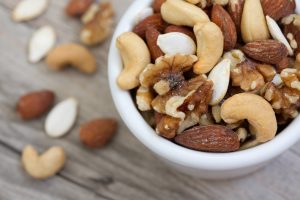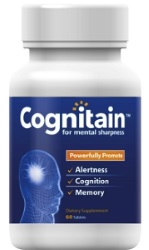
Bowl of mixed nuts on rustic wooden table in natural light.
Almonds, walnuts, peanuts, and pistachios are all delicious nutrient-dense snacks. Nuts are often mentioned as healthy snacks for heart health. Not to mention that they taste great and can be a healthy replacement to chips as a salty and crunchy snack. But did you know that they can also help your brain health? A recent study shows that eating a little bit of nuts everyday can benefit brain health.
About nuts
Nuts come in many varieties, but they all provide rich health benefits. These tasty plant-based treats contain many important nutrients like:
- healthy fats like monounsaturated (MUFA) and polyunsaturated (PUFA) fats
- protein
- soluble and insoluble fibers
- vitamin E
- vitamin K
- folate
- thiamine
- minerals such as magnesium, copper, potassium, and selenium
- antioxidants
- phytosterols
Because of their antioxidant content, nuts are great for reducing the amount of inflammation in the body. This in turn can help lower risk of inflammatory related conditions like heart disease and type 2 diabetes.
In particular, eating just an ounce or two of almonds daily can reduce blood glucose levels after meal time. They can also increase satiety or fullness in those with type 2 diabetes. Also, eating an ounce or so of walnuts daily can help some people lose weight since they also help increase fullness and reduce insulin levels. Finally, research shows that eating an ounce and a half of pistachios daily can help improve lipid markers such as reducing LDL-C or “bad” cholesterol.
Nuts and brain health
A 2019 study looked at data from the China Health and Nutrition Survey over 22 years. Nut intake data was collected from over 4800 study participants in 1991, 1993, and during the years of cognitive function data collection in 1997, 2001, 2004, and 2006. Study results show that nut intake is associated with reduced levels of cognitive decline.
In particular, eating more than 10 grams or more of nuts daily, which equates to about 2 teaspoons a day, may benefit brain health. In fact, the researchers report that this small amount of nuts can improve thinking, reasoning, and memory. Also, they report that this same amount of nuts can improve the brain function of older adults by about 60-percent compared to those who didn’t eat nuts.
Interestingly enough, the same antioxidant and anti-inflammatory qualities that help improve heart health also benefits brain health. Therefore, make sure to add nuts to your daily routine to reap these awesome health benefits.
Other ways to help brain health
Now if you’re allergic to nuts, this talk of nuts and health benefits may be a bummer. However, that doesn’t mean that they aren’t other ways you can improve brain health. Read below for tips on keeping your brain at its healthiest.
- Keep your brain busy: As the saying goes “Use it or lose it.” The same concept works for brain health. Just like you exercise your body to stay fit, you should not forget to do the same for your brain. Crossword puzzles, reading, drawing, painting, and even crafts can help keep your brain strong.
- Exercise your body: Like I mentioned before, exercise for your body is important for heart health, but also for brain health too. This is because your heart pumps all-important oxygen-rich blood to the brain to keep it healthy. Every step counts, so walk, jog, bike, dance, or do whatever movement you enjoy. Your brain will thank you.
- Improve your diet: Eating lots of fiber-rich and antioxidant-rich fruits and vegetables can benefit brain health as well as overall health. This is because, just like nuts, these antioxidants reduce inflammation in the body that can increase chronic disease risk. Color your plate with a variety of fruits and vegetables each day to reap the benefits of the different antioxidants they contain that possess different healthful properties.
- Limit alcohol intake and stop smoking: Smoking can constrict blood vessels , which means less oxygen reaches your brain. For help to quit smoking, visit Smokefree.gov for helpful resources. And as far as alcohol goes, research shows that more than two standard drinks a day can increase dementia risk. A standard drink is equal to 12 ounces beer, 5 ounces wine, or 1.5 ounces liquor.
- Take a supplement for brain health: If you don’t feel like you’re getting enough brain food in your diet, then you can add a brain health supplement like UltaMind to your daily routine. UltaMind by Vita Sciences contains innovative compounds like St. John’s Wort and Gingko biloba, to name a few that have been shown to support brain health, memory, focus, and concentration.
References:
de Souza, R., Schincaglia, R. M., Pimentel, G. D., & Mota, J. F. (2017). Nuts and Human Health Outcomes: A Systematic Review. Nutrients, 9(12), 1311. doi:10.3390/nu9121311
Harvard Health Publishing Harvard Medical School (accessed April 4, 2019) “12 ways to keep your brain young.” https://www.health.harvard.edu/mind-and-mood/12-ways-to-keep-your-brain-young
Li, Ming and Shi, Z. (February 2019) “A Prospective Association of Nut Consumption with Cognitive Function in Chinese Adults Aged 55+ – China Health and Nutrition Survey.” The Journal of Nutrition, Health, and Aging, 23(2): 211-216.
Roche, Ph.d., B. (July 17, 2014) “10 Ways to Improve Your Brain Health.” Psychology Today, https://www.psychologytoday.com/us/blog/iq-boot-camp/201407/10-ways-improve-your-brain-health
 Yet another reason to eat chocolate, as if you needed one. Besides tasting delicious, chocolate has many health benefits. Recent studies show that eating a bit of dark chocolate each day may help to improve vision, memory, and lower stress.
Yet another reason to eat chocolate, as if you needed one. Besides tasting delicious, chocolate has many health benefits. Recent studies show that eating a bit of dark chocolate each day may help to improve vision, memory, and lower stress. Sleep is a precious commodity in your busy life. Between work, taking care of loved ones, and running errands, it is a wonder you find time to sleep at all. However, it is important to make time for sleep because of all of the health benefits adequate sleep can provide. A recent study suggests that making a to-do list may help ease your mind so you can capture more sleep.
Sleep is a precious commodity in your busy life. Between work, taking care of loved ones, and running errands, it is a wonder you find time to sleep at all. However, it is important to make time for sleep because of all of the health benefits adequate sleep can provide. A recent study suggests that making a to-do list may help ease your mind so you can capture more sleep. you have high blood pressure, heart disease may be the health concern most on your mind. However, high blood pressure can be a risk factor for more than just heart conditions. A recent study has found that women in their 40’s with high blood pressure have an increased risk of dementia.
you have high blood pressure, heart disease may be the health concern most on your mind. However, high blood pressure can be a risk factor for more than just heart conditions. A recent study has found that women in their 40’s with high blood pressure have an increased risk of dementia.


